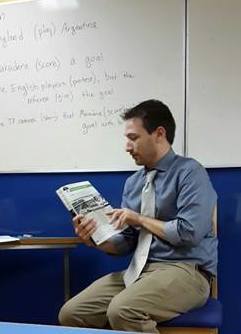What does it take to get a CELTA certificate? To start with, you’ve got to get into the damn course. And that’s no simple application. Cambridge boasts that somewhere around 97% of people who take the CELTA pass it, and they can proudly attribute this success rate to their admissions. Applying to the program is a rigorous test of your knowledge of the English language, and sounding of your passion for teaching.
Eager to get in, and confident that my Berkeley English degree more than prepped me for this esteemed course, I downloaded the application. The first page explained that I would probably need reference books to finish. Bullshit, I said to myself, and proceeded to answer the first grammar question. I suddenly realized that I didn’t know the difference between past perfect and past simple tenses. I could consult the Internet, but was I going to hang my chances of getting into the CELTA course on what a few could-be-hacks have written in a Yahoo Answers forum?
Consulting the list of recommended reading found on the first page of the application, I hit up Amazon. Thirty minutes and $100 later, I was sitting in front of a blank application stunned by the fact that I actually need to wait for UPS to arrive before I can complete it. I shook off my stupor and said to myself, No problem, I’ll just answer the personalized essay-form questions first. Let’s see: why do I want to teach in 500 words or less…
When the grammar book and teaching guides came in two days later, it still took me two days to finish the application. I labored over incorrect sentences, explanations of synonyms, verb tenses, short answers about teaching theory, and the like. I learned that the Queen’s English pronounces “march” and “after” with the same vowel phonemes. Hell, I learned what a phucking phoneme is!
After losing a weekend on this application, I submitted it via email. Within a few days I received a reply. Sze at International House in Bangkok would be calling me at 10 pm California time in two days to interview me over the phone. Time to sweat again, I thought.
As I fretted over the next few days, I wondered what she could possibly ask me. The email said she’d go over my answers on the application. Did that mean I got something wrong? Did that mean I was vague? Maybe it’s a trap!
Though long, the interview was quite pleasant. Sze asked a few tough questions, but never did she seem bothered to correct my answers if they were wrong. In fact, it seemed to be more a test of my readiness to learn than my knowledge of the English language. It was also a way to gauge of my personality, as is any interview. With nearly 2 years’ professional interviewing experience, I had learned how to get across the better parts of my personality quite well.
After about 30 minutes, she was offering me a position in the course. More importantly, as was one of the trainers she was offering me a position in her class. She handpicked me.
I later learned how important her selection process was. A CELTA is no joke. It’s rigorous. No one who has taken it can adequately describe how draining it is. It’s not necessarily that it’s difficult. If you get in, you’re probably smart enough and passionate enough to succeed. It’s just intensely time-consuming. Every day from 9 to 5, I was at the school—sometimes later; every evening I was pouring over my lesson plans in my studio apartment; every weekend I was completing assignments that were due sometime next week.
Some people struggled more than others. While I found myself falling naturally into a long-desired dream role in the front of the classroom, others would become flustered and have nervous breakdowns, some of them in front of their practice students. But regardless of how well we all immediately took to teaching, everyone spend hours writing lesson plans, perfecting games and activities, and printing and photocopying well over our allotted page count. Twice a week, we were given 45 minutes to teach. It felt like preparing for a performance. It was a performance. It was a delicate balance of remembering every little thing you learned in your morning “input sessions,” from keeping your TTT (teacher talking time) lower than the STT (student talking time), to giving clear directions, to monitoring, and much more.
In my mid-course one-on-one—a private session where your trainer checks in with you to gauge how you feel you’re progressing, as well as tell you how she thinks you’re doing—Sze asked me where I had taught before the CELTA. Many of the trainees had already initiated EFL careers and were simply honing their skills, or were just gaining the credentials needed to earn more money or clout.
“I’ve never taught a classroom before this course,” I replied.
She was surprised at this. “You’re a natural,” she said.
In hindsight, I realize that the rigorous application did exactly what it was supposed to do—at least it did for me. It gave me a sample of the hard work ahead of me. It indicated that I was a capable and promising candidate for the CELTA certificate. It showed that my heart was in the right place, and that I could excel at the profession if I put my mind to it. And I have to say that makes me feel proud.


This is an excellent post and describes the whole process well, thank you. This is the very reason why we at our Language Centre take CELTA graduates over others…if you come out with that certificate, you are serious!
LikeLike